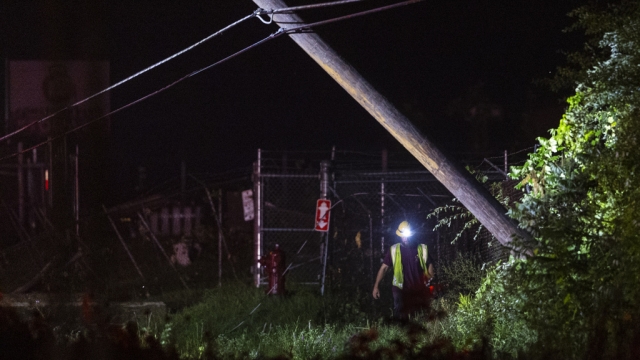Severe storms on Thursday night through Friday morning, with wind gusts of up to 75 miles per hour, left approximately 700,000 people in the U.S. without electricity.
The storms swept through the Great Lakes area, leading to at least four confirmed tornadoes in Michigan. Officials say five people were killed. Three were killed in a head-on collision between vehicles during a storm and one person was pronounced dead at the hospital after a tree fell on their house. A fifth person was killed after vehicles were severely damaged on Interstate 96. It was not immediately clear if the person died as a result of a crash or the storm.
These winds also damaged houses from Detroit to Ohio, toppling trees and triggering the power outages that stretched across Michigan, northern Ohio, and into Pennsylvania.
That storm is now moving east into Pennsylvania and West Virginia, and heading toward Maryland and Virginia.
Meanwhile, in the upper Midwest, people could finally start to get some relief from the extreme heat. Unfortunately, it's now moving South and stretching into the Southeast.
SEE MORE: NOAA, NASA agree that July 2023 was the hottest month on record
The National Weather Service satellite shows the heat dome over the center of the country and moving across Alabama, to northern and central Georgia, and down to the Florida panhandle.
The heat dome is currently covering 19 states, impacting 107 million Americans who are in the hot pocket with triple-digit actual temperatures as well as even higher "feels like" temperatures.
Severe heat alerts are in place across the Ohio River and Mississippi River valleys, as well as from Dallas-Fort Worth to northwestern South Carolina. Heading into the weekend, the focus of these alerts will shift to the Gulf region, spanning from the Rio Grande to the Atlantic Coast.
Chicago has broken two records due to the scorching heat. The city reached a sweltering 100 degrees Fahrenheit, marking its highest temperature in over 10 years, and the heat index, which reflects how the temperature feels, soared to 120 degrees. This stands as the highest ever recorded in the city's history.
For Friday, the heat indicators show Houston at 114 degrees, where they're implementing mandatory water restrictions due to the heat and drought. Dallas is at 112 degrees; Jackson, Mississippi, is at 115; Kansas City is at 110; and Memphis is at 114.
This heat dome shows no signs of dissipating any time soon, even though meteorological fall starts next Friday and the fall equinox is less than a month away.
Trending stories at Scrippsnews.com




